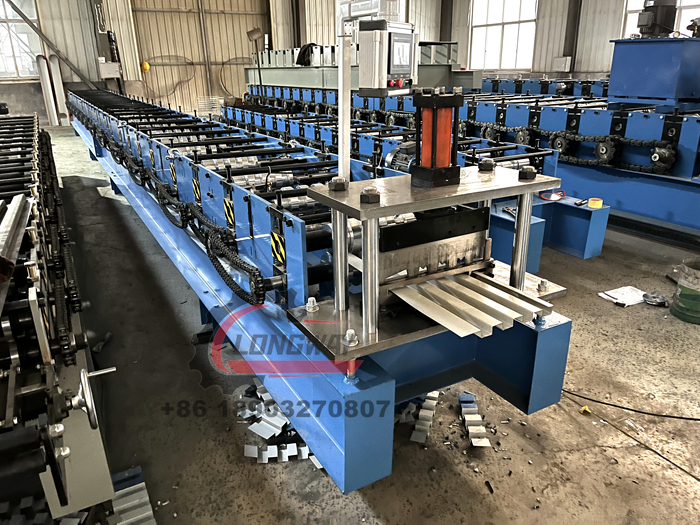metal tile roof roll forming machine
The Advancements and Benefits of Metal Tile Roof Roll Forming Machines
The roofing industry has seen significant advancements over the years, with metal tile roofs gaining substantial popularity among homeowners and builders alike. Metal roofs offer durability, energy efficiency, and aesthetic appeal, making them an excellent choice for various architectural styles. One of the critical technologies that enable the efficient production of metal tile roofs is the metal tile roof roll forming machine. This article explores the features, advantages, and industry impact of these machines.
Understanding Metal Tile Roof Roll Forming Machines
At the core of metal tile roof production lies the roll forming machine, a versatile piece of equipment designed to convert metal coils into finished roofing products. The machine utilizes a continuous bending operation to shape metal into desired profiles with precision. It comprises several components, including a decoiler, roll forming system, cutting mechanism, and control panel, all working in tandem to produce high-quality metal tiles.
How It Works
The process begins with a coil of metal, typically galvanized steel or aluminum, which is fed into the decoiler. From there, the metal sheet is continuously fed into a series of rollers that progressively shape it into the desired profile. After the shaping process, a cutting mechanism trims the metal sheets to the specified length. The efficiency of this process is vital, as it allows manufacturers to produce large volumes of roofing materials quickly and with minimal waste.
Advantages of Using Metal Tile Roof Roll Forming Machines
1. High Production Efficiency One of the most significant benefits of using roll forming machines is their ability to produce metal tiles at high speed. This efficiency reduces production time and costs, allowing builders to meet increasing demands in the market.
2. Cost-Effectiveness Roll forming machines are an investment that pays off in the long term. They facilitate bulk production, which lowers the per-unit cost of metal tiles. Additionally, the durability of metal roofing materials leads to fewer replacements, saving money for homeowners over time.
metal tile roof roll forming machine

3. Precision and Consistency The automated nature of roll forming machines ensures that each metal tile produced is consistent in quality and dimensions. This precision is crucial for roofing applications, as it affects the overall aesthetic and functional integrity of the roof.
4. Customization Options Modern roll forming machines can be customized to produce a wide range of metal tile profiles, colors, and finishes. This flexibility allows manufacturers to cater to various customer preferences and architectural requirements, enhancing their product offerings.
5. Sustainability Metal roofing materials are often made from recycled content and are 100% recyclable at the end of their lifespan. Utilizing roll forming machines allows for minimal waste during production, making it an environmentally friendly option in an industry that increasingly prioritizes sustainability.
6. Ease of Operation With advancements in technology, modern roll forming machines come equipped with user-friendly interfaces and automation features. This ease of operation reduces the skill level needed to run the machines, facilitating a smoother production process and allowing less experienced workers to contribute effectively.
Industry Impact and Future Trends
The rise of metal tile roof roll forming machines has significantly impacted the construction and roofing industries. With faster production times and the ability to meet diverse consumer needs, these machines have become indispensable tools for manufacturers. Moreover, as the demand for sustainable building materials continues to grow, roll forming machines that produce eco-friendly metal roofing solutions are likely to become even more prominent.
Looking ahead, advancements in automation and smart technology will play a crucial role in the evolution of roll forming machines. The integration of artificial intelligence and the Internet of Things (IoT) could lead to enhanced monitoring, predictive maintenance, and improved efficiency, further solidifying the role of these machines in modern manufacturing.
Conclusion
Metal tile roof roll forming machines represent a significant technological advancement in the roofing industry. Their ability to produce high-quality, durable roofing materials efficiently and sustainably has transformed how roofs are manufactured. As the market for metal roofing continues to expand, these machines will remain at the forefront of innovation, driving progress and meeting the needs of a growing and increasingly environmentally conscious consumer base.
-
Roof Panel Machines: Buying Guide, Types, and PricingNewsJul.04, 2025
-
Purlin Machines: Types, Features, and Pricing GuideNewsJul.04, 2025
-
Metal Embossing Machines: Types, Applications, and Buying GuideNewsJul.04, 2025
-
Gutter Machines: Features, Types, and Cost BreakdownNewsJul.04, 2025
-
Cut to Length Line: Overview, Equipment, and Buying GuideNewsJul.04, 2025
-
Auto Stacker: Features, Applications, and Cost BreakdownNewsJul.04, 2025
-
Top Drywall Profile Machine Models for SaleNewsJun.05, 2025








